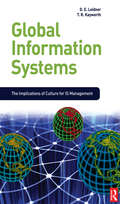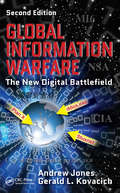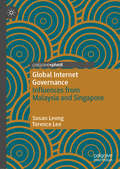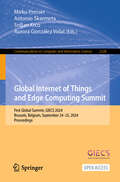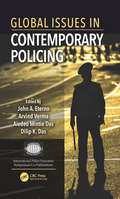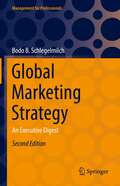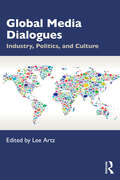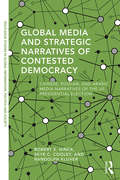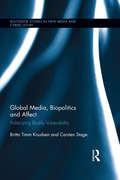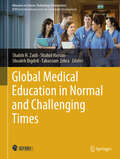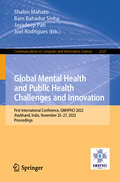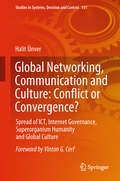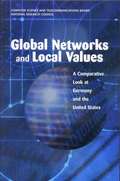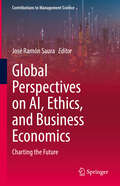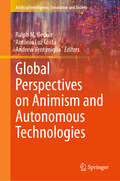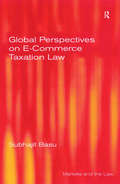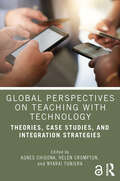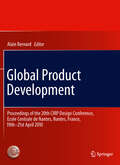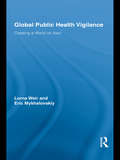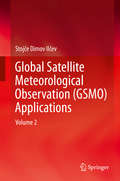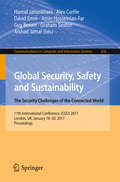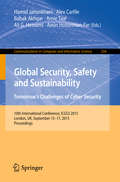- Table View
- List View
Global Information Systems
by Dorothy E Leidner Tim KayworthInformation technology has had a major impact on individuals, organizations and society over the past 50 years. There are few organizations that can afford to ignore IT and few individuals who would prefer to be without it. As managerial tasks become more complex, so the nature of the required information systems (IS) changes - from structured, routine support to ad hoc, complex enquiries at the highest levels of management. Global Information Systems aims to present the many complex and inter-related issues associated with culture in the management of information systems. The editors have selected a wide range of contemporary articles from leading experts in North America and Europe that represent a wide variety of different national and cultural environments. They offer valid explanations for, rather than simply pointing out cultural differences in articles that cover a variety of national cultures, including: China, Egypt, Finland, Hong Kong, Hungary, India, Jamaica, Peru South Korea, Kuwait, Mexico, Singapore, Sweden, the United Arab Emirate, the UK, and the US.
Global Information Warfare: The New Digital Battlefield, Second Edition
by Andrew Jones Gerald L. KovacichSince the turn of the century much has happened in politics, governments, spying, technology, global business, mobile communications, and global competition on national and corporate levels. These sweeping changes have nearly annihilated privacy anywhere in the world and have also affected how global information warfare is waged and what must be do
Global Internet Governance: Influences from Malaysia and Singapore
by Terence Lee Susan LeongThis book addresses the complex issue of global Internet governance by focusing on its implementation in Malaysia and Singapore. The authors draw insights, identify, revisit and flesh out the discourses circulating since the 1990s and pitch them against global internet governance concerns.Internet governance, thought managed domestically/nationally, is a global issue. It is at the heart of how the internet works yet remains hidden within the 'black box' of governance language. While several scholars have entered the fray in recent years, especially in the past decade, very few of them are aware that the Malaysian and Singaporean governments have in fact been at the forefront of Internet regulatory strategies from the early 1990s. The book identifies, revisits and gives flesh to some of the discourses circulating in Southeast Asia at the time and pitches it against current governance concerns. Readers of this book will understand how and why Malaysia and Singapore are important contributors to the issue of internet governance. This knowledge will inform a depth of understanding of why China is keenly seeking to stake its demands on internet governance and sovereignty, and likely American and global responses. Readers will also appreciate how and why the regulation of the Internet has been and will remain a site of contestation and control.
Global Internet of Things and Edge Computing Summit: First Global Summit, GIECS 2024, Brussels, Belgium, September 24–25, 2024, Proceedings (Communications in Computer and Information Science #2328)
by Antonio Skarmeta Srdjan Krco Mirko Presser Aurora González VidalThis Open Access book constitutes the proceedings from the First Global Internet of Things and Edge Computing Summit, GIECS 2024, held in September 24–25, 2024, in Brussels, Belgium. The 12 full papers presented here were carefully reviewed and selected from 21 submissions. These papers have been organized under the following topical sections: Industrial Internet of Things (IIoT) and Digital Twins; Data Management, Privacy, and Trust in Distributed Systems; Edge Computing and Cross-Domain Systems.
Global Issues in Contemporary Policing (International Police Executive Symposium Co-Publications)
by Arvind Verma Dilip K. Das John A. Eterno Aiedeo Mintie DasThis book addresses six areas of policing: performance management, professional and academic partnerships, preventing and fighting crime and terrorism, immigrant and multicultural populations, policing the police, and cyber-security. The book contains the most current and ground-breaking research across the world of policing with contributors from over 20 countries. It is also a suitable reference or textbook in a special topics course. It consists of edited versions of the best papers presented at the IPES annual meeting in Budapest.
Global Journalism Practice and New Media Performance
by Jr Yusuf Kalyango David H MouldGlobal Journalism Practice and New Media Performance provides an overview of new and traditional media in their political, economic and cultural contexts while exploring the role of journalism practice and media education. The authors examine media systems in 16 countries, including China, Russia and the United States.
Global Marketing Strategy: An Executive Digest (Management for Professionals)
by Bodo B. SchlegelmilchThis book has been written for experienced managers and students in postgraduate programs, such as MBA or specialized master’s programs. In a systematic yet concise manner, it addresses all major issues companies face when conducting business across national and cultural boundaries, including assessing and selecting the most promising overseas markets, evaluating market entry alternatives, and examining the forces that drive adaptation versus standardization of the marketing mix. It looks at the various global marketing challenges from a strategic perspective and also addresses topics not usually found in international marketing texts, such as aligning marketing strategies with global organizational structures and managing the relationship between national subsidiaries, regional headquarters, and global headquarters, as well as corporate social responsibility challenges and pertinent future trends that are likely to affect global business.A guide to suitable video resources giving additional background to this book can be downloaded by all readers by contacting the author. Instructors can also obtain additional support material for teaching. Please email Bodo Schlegelmilch at WU Vienna, using your institutional email and stating your university affiliation: - More than 400 PowerPoint slides covering the material in each chapter- Open Ended Questions - A comprehensive multiple choice test bank with solutions
Global Media Apocalypse
by Jeff LewisThe modern world seems trapped between fantasies of infinite pleasure and the prospects of total global catastrophe. Global Media Apocalypse explores these contrary imaginings through an evolving cultural ecology of violence. Articulated through the global media, these apocalyptic fantasies express a profoundly human condition of crisis.
Global Media Dialogues: Industry, Politics, and Culture
by Lee ArtzThis book, the first of its kind, brings together leading scholars from multiple perspectives in a serious dialogue about continuity and change in global media production and content. Looking at a wide swath of the world, these authors show the emergence of transnational collaboration in global television and film production across national borders that seem to transcend national cultures and identities. At the same time, traditional class analysis of such phenomena is reframed within the rise of myriad social movements for equality, democracy, human rights, and defense of the environment. What are the effects of media, local or global? Does the West continue to dominate or is cultural imperialism waning? With original chapters written by leading scholars from a variety of disciplines, this book will appeal to students and scholars interested in global media communication, cultural studies, and international political economy.
Global Media Dialogues: Industry, Politics, and Culture
by Lee ArtzThis book, the first of its kind, brings together leading scholars from multiple perspectives in a serious dialogue about continuity and change in global media production and content. Looking at a wide swath of the world, these authors show the emergence of transnational collaboration in global television and film production across national borders that seem to transcend national cultures and identities. At the same time, traditional class analysis of such phenomena is reframed within the rise of myriad social movements for equality, democracy, human rights, and defense of the environment. What are the effects of media, local or global? Does the West continue to dominate or is cultural imperialism waning? With original chapters written by leading scholars from a variety of disciplines, this book will appeal to students and scholars interested in global media communication, cultural studies, and international political economy.
Global Media and Strategic Narratives of Contested Democracy: Chinese, Russian, and Arabic Media Narratives of the US Presidential Election (Routledge Studies in Global Information, Politics and Society)
by Robert S. Hinck Skye C. Cooley Randolph KluverIn order to better understand how the world viewed the US 2016 presidential election, the issues that mattered around the world, and how nations made sense of how their media systems constructed presentations of the presidential election, Robert S. Hinck, Skye C. Cooley, and Randolph Kluver examine global news narratives during the campaign and immediately afterwards. Analyzing 1,578 news stories from 62 sources within three regional media ecologies in China, Russia, and the Middle East, Hinck, Cooley, and Kluver demonstrate how the US election was incorporated into narrative constructions of the global order. They establish that the narratives told about the US election through national and regional media provide insights into how foreign nations construct US democracy, and reflect local understandings regarding the issues, and impacts, of US policy towards those nations. Avoiding jargon-laden prose, Global Media and Strategic Narratives of Contested Democracy is as accessible as it is wide-ranging. Its empirical detail will expand readers’ understanding of soft power as narrative articulations of foreign nation’s policies, values, and beliefs within localized media systems. Communication/media studies students, as well as political scientists whose studies includes media and global politics, will welcome its publication.
Global Media, Biopolitics, and Affect: Politicizing Bodily Vulnerability (Routledge Studies in New Media and Cyberculture)
by Britta Timm Knudsen Carsten StageGlobal Media, Biopolitics and Affect shows how mediations of bodily vulnerability have become a strong political force in contemporary societies. In discussions and struggles concerning war involvement, healthcare issues, charity, democracy movements, contested national pasts, and climate change, performances of bodily vulnerability is increasingly used by citizens to raise awareness, create sympathy, encourage political action, and to circulate information in global media networks. The book thus argues that bodily vulnerability can serve as a catalyst for affectively charging and disseminating particular political events or issues by means of media. To investigate how, when and why that happens, and to evaluate the long-term social impacts of mediating bodily vulnerability, the book offers a theoretical framework for understanding the role of bodily vulnerability in contemporary digital media culture. Likewise, it presents a range of close empirical case studies in the areas of illness blogging, global protests after the killing of Neda Agda Soltan in Iran, charity communication, green media activism, online war commemoration and digital witnessing related to conflicts in Sarajevo and Ukraine.
Global Medical Education in Normal and Challenging Times (Advances in Science, Technology & Innovation)
by Shabih H. Zaidi Shahid Hassan Shoaleh Bigdeli Tabassum ZehraThis book is written by several medical educators from developed as well as developing countries based on decades of experience in teaching. The unique experience gained during the COVID-19 pandemic has added new dimensions to the traditional pedagogy, andragogy, and heutagogy, documented here. The salient topics include distance learning, virtual classrooms, virtual workshops on OSCEs, open book exams, micro-learning, micro-credentialing, blended or digitalized curriculum delivery, academic leadership, communication skills, professionalism, telemedicine, bioethics, cyber clinics, artificial intelligence, etc. This book is used as a text or reference book by physicians, teachers, scholars, students, and medical universities for teachers' training, capacity building, and guidance on fundamental pillars of cognitive domains of knowledge, skills, and attitude, as well as factual, conceptual, procedural, and metacognitive skills. It is also a source of guidance in faculty enhancement and toward continued quality improvement in medical education.
Global Mental Health and Public Health Challenges and Innovation: First International Conference, GMHPHCI 2022, Jharkhand, India, November 25–27, 2022, Proceedings (Communications in Computer and Information Science #2327)
by Shalini Mahato Bam Bahadur Sinha Jayadeep Pati Joel RodriguesThis book constitutes the refereed proceedings of the First international conference on Global Mental Health and Public Health Challenges and Innovation, held in Ranchi, Jharkhand, India, in November 25–27, 2022. The 7 full papers in this book were carefully reviewed and selected from 62 submissions. These papers focus on the Application of modern techniques, such as Internet of Things (IoT), Artificial Intelligence (AI), Machine Learning (ML), and Deep Learning (DL), to the current challenges in the field of Mental health and public health.
Global Networking, Communication and Culture: Conflict or Convergence?
by Halit ÜnverPursuing an interdisciplinary approach, this book offers detailed insights into the empirical relationships between overall social key figures of states and cultures in the fields of information and communication technology (ICT) (digital divide/inequality), the economy, education and religion. Its goal is to bridge the ‘cultural gap’ between computer scientists, engineers, economists, social and political scientists by providing a mutual understanding of the essential challenges posed and opportunities offered by a global information and knowledge society. In a sense, the historically unprecedented technical advances in the field of ICT are shaping humanity at different levels and forming a hybrid (intelligent) human-technology system, a so-called global superorganism. The main innovation is the combined study of digitization and globalization in the context of growing social inequalities, collapse, and sustainable development, and how a convergence towards a kind of global culture could take place. Accordingly, the book discusses the spread of ICT, Internet Governance, the balance between the central concentration of power and the extent of decentralized power distribution, the inclusion or exclusion of people and states in global communication processes, and the capacity for global empathy or culture.
Global Networks and Local Values: A Comparative Look at Germany and the United States
by Committee to Study Global Networks Local ValuesWhether you call it the third wave, the information revolution, or the virtually connected world, the implications of a global information network are profound. As a society, we want to forestall the possible negative impacts without closing the door to the potential benefits. But how?Global Networks and Local Values provides perspective and direction, focusing on the relationship between global information networks and local values-that is, the political, economic, and cultural norms that shape our daily lives. This book is structured around an illuminating comparison between U.S. and German approaches toward global communication and information flow. (The United States and Germany are selected as two industrialized, highly networked countries with significant social differences.)Global Networks and Local Values captures the larger context of technology and culture, explores the political and commercial institutions where the global network functions, and highlights specific issues such as taxation, privacy, free speech, and more. The committee contrasts the technical uniformity that makes global communication possible with the diversity of the communities being served and explores the prospects that problems resulting from technology can be resolved by still more technology. This thoughtful volume will be of interest to everyone concerned about the social implications of the global Internet.
Global Perspectives on AI, Ethics, and Business Economics: Charting the Future (Contributions to Management Science)
by José Ramón SauraThis book offers an in-depth exploration of the complex and rapidly evolving world of artificial intelligence (AI), focusing on its ethical, economic, and business dimensions. It provides a comprehensive analysis that intertwines historical context, philosophical ethics, global economic impacts, regulatory landscapes, workforce dynamics, corporate governance, consumer behavior, data ethics, and the use of AI for the good of society. After reviewing the evolution of AI, it offers insights into its historical milestones and the trajectory it may take in the future. This sets the stage for a broader discussion on how AI is not just a technological phenomenon but also a catalyst for ethical, economic, and societal transformation. The book emphasizes the importance of understanding AI&’s historical development in order to gauge its potential impacts on our future. It examines various ethical theories, including utilitarianism, deontology, and virtue ethics, and their application in the realm of AI. Moreover, it explores how AI is reshaping industries, shifting market dynamics, and transforming the global economic landscape.
Global Perspectives on Animism and Autonomous Technologies (Artificial Intelligence, Simulation and Society)
by Andrew Ventimiglia Ralph M. Becker Antônio Luz CostaThis volume provides a timely analysis of the emerging phenomenon of autonomous technology, a topic of intense contemporary importance given the transformative potential and risks posed by rapidly developing AI systems. It utilizes a unique approach by focusing on the ways that these technologies can be understood via the lens of animism and ‘techno-animism,’ a term that denotes how society and individual users are attributing life-like properties – agency, intention, and will – to technological systems. The volume further interrogates and critiques the ways that autonomous technologies are often intentionally designed to promote socioemotional connections with users. The volume investigates such technologies through a variety of global settings and interdisciplinary lenses. With contributions from scholars across anthropology, sociology, communication studies, law, and design theory, it offers a range of perspectives on how autonomous technologies are reshaping cultural and social institutions worldwide. Furthermore, this collection addresses the urgent need for concrete research on the readiness of legal and social frameworks to incorporate autonomous technologies. With the imminent widespread integration of autonomous technologies into our everyday lives, the volume provides a critical examination of human-technology interaction and its immediate implications, guiding readers through the intricate web of digital interconnectedness that is on course to define the future of humanity.
Global Perspectives on E-Commerce Taxation Law (Markets And The Law Ser.)
by Subhajit BasuIn its most advanced form, e-commerce allows unidentified purchasers to pay obscure vendors in 'electronic cash' for products that are often goods, services and licenses all rolled into one. This book considers the implications for the domestic and international tax systems of the growth of e-commerce. It covers a wide variety of activities, from discussion of the principles governing direct and indirect taxation, to explanation of the implementation and use of e-commerce on the part of businesses as well as the application of existing tax principles in this field. With its focus on the broader issues surrounding the expansion of e-commerce and its attention to the problems arising internationally in this field, Global Perspectives in E-Commerce Taxation Law will appeal to scholars worldwide.
Global Perspectives on Teaching with Technology: Theories, Case Studies, and Integration Strategies
by Helen Crompton Agnes Chigona Nyarai TunjeraGlobal Perspectives on Teaching with Technology presents a wealth of current research on how teacher education and training programs around the world are preparing teachers to integrate and apply learning technologies across subjects, grade levels, and regions. Digital tools are more integral than ever to an accessible and well-rounded education, although their rapid evolution and proliferation necessitate new guidance into their effective integration and intended outcomes. This book provides graduate students, faculty, and researchers of teacher education, as well as trainers of in-service teachers with field-tested frameworks, evidence-based theories and models, and real-world examples of the complexities and affordances of teaching with technology. Internationally sourced to reflect today's richly diverse and globalized learner populations, the case studies collected here offer fresh approaches for teacher educators and a springboard for education researchers studying how practitioners can thrive in their classrooms and foster equity among students.Chapter 16 of this book is freely available as a downloadable Open Access PDF at http://www.taylorfrancis.com under a Creative Commons Attribution-Non Commercial-No Derivatives (CC-BY-NC-ND) 4.0 license.
Global Product Development: Proceedings of the 20th CIRP Design Conference, Ecole Centrale de Nantes, Nantes, France, 19th-21st April 2010
by Alain BernardThis book of proceedings is the synthesis of all the papers, including keynotes presented during the 20th CIRP Design conference. The book is structured with respect to several topics, in fact the main topics that serve at structuring the program. For each of them, high quality papers are provided. The main topic of the conference was Global Product Development. This includes technical, organizational, informational, theoretical, environmental, performance evaluation, knowledge management, and collaborative aspects. Special sessions were related to innovation, in particular extraction of knowledge from patents.
Global Public Health Vigilance: Creating a World on Alert (Routledge Studies in Science, Technology and Society)
by Lorna Weir Eric MykhalovskiyGlobal Public Health Vigilance is the first sociological book to investigate recent changes in how global public health authorities imagine and respond to international threats to human health. This book explores a remarkable period of conceptual innovation during which infectious disease, historically the focus of international disease control, was displaced by "international public health emergencies," a concept that brought new responsibilities to public health authorities, helping to shape a new project of global public health security. Drawing on research conducted at the World Health Organization, this book analyzes the formation of a new social apparatus, global public health vigilance, for detecting, responding to and containing international public health emergencies. Between 1995 and 2005 a new form of global health surveillance was invented, international communicable disease control was securitized, and international health law was fundamentally revised. This timely volume raises critical questions about the institutional effects of the concept of emerging infectious diseases, the role of the news media in global health surveillance, the impact of changes in international health law on public health reasoning and practice, and the reconstitution of the World Health Organization as a power beyond national sovereignty and global governance. It initiates a new research agenda for social science research on public health.
Global Satellite Meteorological Observation (GSMO) Applications: Volume 2
by Stojče Dimov IlčevThis book presents principal structures of space systems functionality of meteorological networks, media and applications for modern remote sensing, transmission systems, meteorological ground and users segments and transferring weather data from satellite to the ground infrastructures and users. The author presents techniques and different modes of satellite image interpretation, type of satellite imagery, spectral imaging properties, and enhancement of imaging technique, geo-location and calibration, atmospheric and surface phenomena. Several satellite meteorological applications are introduced including common satellite remote sensing applications, weather analysis, warnings and prediction, observation and measurements of meteorological variables, atmosphere and surface applications, ocean and coastal applications, land, agriculture and forestry applications, and maritime and aviation satellite weather applications. The author also covers ground segment and user segment in detail. The final chapter looks to the future, covering possible space integrations in meteorological and weather observation.This is a companion book of Global Satellite Meteorological Observation Theory (Springer), which provides the following topics:Evolution of meteorological observations and history satellite meteorologySpace segment with satellite orbits and meteorological payloadsAnalog and digital transmission, type of modulations and broadcasting systemsAtmospheric radiation, satellite meteorological parameters and instrumentsMeteorological antenna systems and propagation
Global Security, Safety and Sustainability - The Security Challenges of the Connected World
by Hamid Jahankhani Alex Carlile Amin Hosseinian-Far David Emm Guy Brown Graham Sexton Arshad JamalThis book constitutes the refereed proceedings of the 11th International Conference on Global Security, Safety and Sustainability, ICGS3 2017, held in London, UK, in January, 2017. The 32 revised full papers presented were carefully reviewed and selected from 74 submissions. The papers are organized in topical sections on the future of digital forensics; cyber intelligence and operation; information systems security management; systems security, safety, and sustainability; cyber infrastructure protection.
Global Security, Safety and Sustainability: Tomorrow's Challenges of Cyber Security
by Babak Akhgar Hamid Jahankhani Alex Carlile Amie Taal Ali G. Hessami Amin Hosseinian-FarThis book constitutes the refereed proceedings of the 10th International Conference on Global Security, Safety and Sustainability, ICGS3 2015, held in London, UK, in September 2015. The 31 revised full papers presented were carefully reviewed and selected from 57 submissions. The papers focus on the challenges of complexity, rapid pace of change and risk/opportunity issues associated with the 21st century living style, systems and infrastructures.
